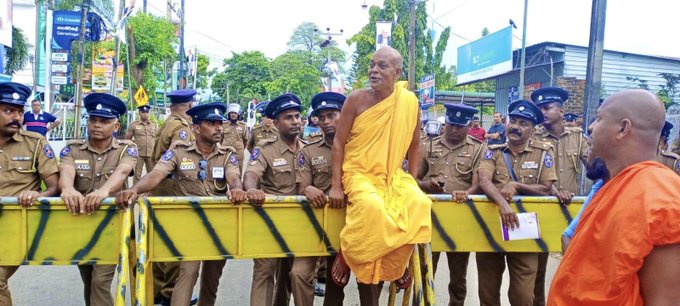Image: Ampitiye Sumana enjoys impunity for dozens of hate crimes against Tamils and Muslims.
A clip circulating on social media these days depicts an extremist Sinhala Buddhist monk, Ampitiye Sumanarathana, threatening to kill all of the Tamils in the south. “Every single Tamil person will be cut into pieces!” exclaims the monk. ”They will all be killed! All the Tamils in the south will be cut into pieces and butchered! The Sinhalese will massacre them.”
Sumanarathana has a long history of racist hate speech, assault and incitement of violence and he has done so with impunity, especially from the police and the judiciary. The inaction against the rabidly racist monk stands in deep contrast as to how the police and the judiciary have been quick to use anti-hatred legislation against minority communities. In recent years, the ICCPR Act of 2007 has been used against poets, journalists and even a woman who allegedly wore a garment erroneously depicting a Buddhist religious symbol.
The ICCPR and its sister Covenant on Economic Social and Cultural Rights (ICESCR) are called the ‘International Bill of Rights’ that provide the foundation for international human rights law.
These two instruments, adopted by the UN General Assembly in 1966 gave legally binding effect to the Universal Declaration of Human Rights of 1948 and is the source document for a number of international, regional and local laws enacted since.
For example, the fundamental rights chapter of the 1978 Constitution of Sri Lanka copies provisions liberally from the ICCPR. Sri Lanka ratified the ICCPR in 1980 and finally enacted legislation to domesticate its obligations in 2007.
By definition, the ICCPR is an instrument that enhances the rights of citizens and protects them against excessive restraints by the State. In an ironic twist, in Sri Lanka, the ICCPR Act, a law meant to protect human rights and guarantee the peaceful expression of views, has been extensively, and very selectively used for the very opposite purpose, to curtail opinion and terrorise the citizenry, especially targeting minority communities.
The act provides for provisions to criminalise the advocacy of “national, racial or religious hatred that constitutes incitement to discrimination, hostility or violence”. The use of this provision has been greatly disproportionate against perceived affronts against Buddhism.
Just as disturbing are the instances in which the ICCPR Act should have been used but was not. For example, in 2014, when there was clear incitement to violence in Kalutara by a group of racist monks attached to the Bodu Bala Sena, there were no arrests made under the ICCPR Act or any other law. The violence incited by the BBS killed two Muslims who were attacked by a mob. To this day none of the perpetrators of the crime nor their instigators have been held accountable.
It is a fundamental tenet in interpreting law that the intentions of the drafters be given due consideration. In the context of the ICCPR Act, the Attorney General and the Police have made a mockery of this basic principle. Neither the International Covenant nor the local legislation was intended to be used in a draconian and selective manner to curtail rights of individuals, minority groups or political opponents.
Freedom of expression, even that tantamount to hate speech cannot only be the right of Ampitiye Sumanarathana and Buddhist priests while incitement of national, racial or religious hatred be applicable only to non-Sinhala Buddhists.
The fundamental principles of equality before the law, non discrimination on the basis of race and religion, and other fundamental freedoms enshrined within the ICCPR should be applicable to all citizens equally. How the Government responds to Ampitiye Sumanarathana inciting racial violence will be an acid test on the use of the ICCPR Act and the credibility of the judicial system.
